
ISLAMABAD: The latest artworks of Wasi Haider were displayed at Aqs-Jharoka on Tuesday, at which the announcement for the association of the two art galleries was also made.
The exhibition featuring over 30 art pieces, including paintings and calligraphy, was inaugurated by renowned poet Iftikhar Hussain Arif.
Mr Arif appreciated the artistic skills of Mr Haider and shared anecdotes about the cultural life of Karachi in the past and his association with legendary painters, writers and calligraphers including Sadequain, Shakir Ali and Jamil Naqsh.
He also expressed concern over the decline in creative work and neglect of art and literature by media and society.
“Even the state-run PTV and radio channels have stopped airing and broadcasting serious programmes on music, literature and art,” he said.
“Marvellous calligraphy is being produced in Iran, perhaps the only Muslim country where calligraphy seems to be at its zenith. You will find calligraphies of verses of the Quran and poetry by Rumi, Saadi and Hafiz in almost every house,” Mr Arif said.
Artists Mansur Rahi and Hajra Mansur also appreciated the artworks on display, saying he has very skilfully used the technique of pointillism. The composition of colour and texture and other elements is amazing, Mr Rahi said.
“Mr Haider’s art is organic. He paints freestyle but within his own parameters of creativity,” said writer Wali Haider.
Wasi Haider maintains harmony and balance between the tone, texture, shape and movement in all his works, said figurative artist Tayyaba Aziz.
A civil draughtsman and self-taught artist, Wasi Haider is known for neo-impressionist paintings in soft colours, semi abstract figures and calligraphy. He is perhaps one of the few artists who use this technique but he also works in other mediums and on varied topics.

Most of his artwork is in black with some use of bright red, orange, green and blue.
“I get a paintbrush and palette and paint whatever comes to my mind,” he told Dawn.
Asked about his series Faces, he said fragrance and long hair symbolises the independence of women.
In the series, Mr Haider had painted one complete face and half a face in oil on canvas with black ink which was a comment on the hypocrisy and complexity of society.
“The artist has used very bold strokes and colours in three genres,” said the curator of the show and director of the Jharoka Gallery, Nahida Raza.
It took Wasi Haider eight months to complete the art pieces, she said.
About pointillism, she says it is a technique where small, distinct dots of colours are applied in a pattern to form an image.
Wasi Haider has also set a new record by painting 100 different titles of Akhtar Saleemi’s novel Jaagey Hain Khwab Mein.
He has participated in over 20 solo and 250 group shows mostly in Karachi and Islamabad and out of the country as well.
A recipient of the Quaid-i-Azam Youth Award, Mr Haider writes articles in the Daily Jang, Karachi, poetry and short stories.
A large number of literati from the twin cities including Mahboob Zafar, Akhtar Salimi, Hassan Abbas, Akhtar Rizvi and Tazeen Akhtar visited the show.
Published in Dawn, October 18th, 2018















































Dear visitor, the comments section is undergoing an overhaul and will return soon.